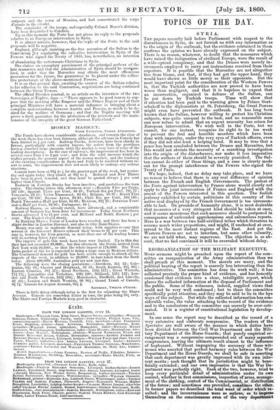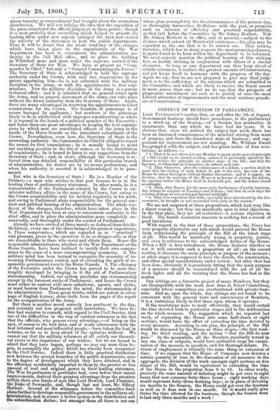In one sense the report may be described as the
record of a very extensive and elaborate compromise. The readers of the Spectator are well aware of the manner in which duties have been divided between the Civil War Department and the Mili- tary Department of the Horse Guards; that purely empirical ar- rangement was a compromise compounded out of manyseparate
i
compromises, leaving the ultimate result almost to the influence of haphazard. Without impugning the accuracy of those wit- nesses who asserted that perfect harmony rules between the War Department and the Horse Guards, we shall be safe in asserting that each department was greatly impressed with its own inhe- rent merits ; each thought that its jurisdiction might be bene- ficially extended; and our own impression is that the War De- partment was perfectly right. Each of the two, however, tried to keep every particular detail of administration under its own control, whether in first commissions, inspection of arms, manage- ment of the clothing, control of the Commissariat, or distribution of the forces; and sometimes one prevailed, sometimes the other. In former papers we described the total want of order which re- sulted; and the inconveniences were so serious, as to *press themselves on the consciousness even of the very depailanent
whose tenacity or encroachment had brought about the anomalous distribution. We will not indulge the idea that the exposition of the press stimulated the official judgment on these points; though it is most probable that everything which helped to present the leading ideas under new aspects enlarged the view and excited the activity of the statesmen in both the public departments.
Thus it will be found that the whole tendency of the changes which have taken place in the organization of the War
Department has been to concentrate the administrative au- thority in the Pall Mall office, and to place the building in Whitehall more and more under the supreme control of the Secretary of State for War. We have at present no " Com- mander in Chief," but only a " General Commanding the Forces." The Secretary of State is acknowledged to hold the supreme authority under the Crown, with only two reservations in the patent appointing him—he is not entrusted with the military i discipline in the Army, or with the appointments to first com- missions. Now the military discipline of the Army is a purely technical affair ; and it is admitted that no general action upon the Army, and no general movement of the Army, can take place without the direct authority from the Secretary of State. Again, there are many advantages in reserving the appointments to select commissions for the Crown. The fountain of patronage is of course besieged by applicants ; but nowhere is the patronage likely to be so adulterated with improper considerations as where it is reposed in the hands of a political member of the Executive ; And hence there are great advantages in keeping the first commis- sions by which men are constituted officers of the Army in the hands of the Horse Guards as the immediate subordinate of the Crown. Nevertheless, even here the Secretary of State is the overruling authority : the Commander-in-Chief is obliged to report the names for first commissions ; he is morally bound to point out anything peculiar in the list of names, or in the distribution of commissions ; he is bound to listen to any suggestions from the Secretary of State ; and, in short, although the Secretary is re- lieved from any detailed responsibility in this particular branch of administration, his duties are by is' means perfunctory, and when his authority is asserted it is acknowledged to be para- mount.
But who is the Secretary of State ? He is a Member of the Cabinet,—a man who attains to that post because he is in the leading class of parliamentary statesmen. In other words, he is a representative of the Parliament selected by the Crown to ad- minister military affairs in the name of thc,Crown, but owing to the Crown accountability only for faithful regularity in his work, and owing to Parliament alone responsibility. for the general con- duct and political bearing of his administration. The whole ten- dency of the changes, therefore, which have taken place in the War Department has been at once to concentrate authority in the chief office, and to place the administration more completely un- reservedly, and thoroughly under the control of Parliament.
Already we have arrived at three morals as deduced from this lit- tle history, every one of the three being of the greatest importance. 1. These compromises, which are regarded as so " practical" and pleasant, prove in the operation to be as disagreeable as they are discreditable to those who covet and obtain them. Hence the responsible administrators, whether of the War Department or the Horse Guards, have been inclined to rectify their own compro- mises in the sense of a more uncompromising symmetry. 2. The military mind has been trained to recognize the necessity of in- creasing Parliamentary control, and of extending the spirit of re- sponsible government even to the Horse Guards. 3. The efficiency of the Executive under the Crown has proved to be more tho- roughly developed by bringing to it the aid of Parliamentary statesmanship. Indeed, our system precludes any statesmanship except in the foremost ranks of Parliament; and hence the Crown must either be content with mere subalterns, agents, and clerks, or must borrow from Parliament the mind, the statesmanship of its administration. These great truths, which are patent in every page of English history, shine forth from the pages of the report on.the reorganization of the Army. But there is another moral scarcely less pertinent to the day, and certainly not less pregnant with instruction. We have be- fore had occasion to remark, with regard to the Civil Service, that one of the difficulties in the way of outdoor reformers is the fact that the officials, who possess every advantage,—of being on the spot, of access to the best data, and of ready intercourse with the best informed and most influential people,—have taken the lead in reforms, so far as to keep ahead of the agitators without. We cannot say that the military reformers at all satisfy our theoreti- cal views or the impatience of our wishes ; but we are bound to admit that they have begun, perhaps we may say more than be- gun, to exemplify the policy which has already been recognized in the Civil Service. Indeed there is little practical distinction now between the several branches of the public departments, save in the degree of development which they have attained, and in the efficiency accidentally imparted to them by the greater or less amount of zeal and original power in their leading statesmen. The War Departments in particular had, even before their recent improvements, derived their greatest advantage from the presence within their own limits of men like Lord Howick, Lord Panmure, the 'Duke of Newcastle, and, though last not least, Mr. Sidney Herbert. Several of the witnesses before the committee have plans further to develope responsible government in the military ad- ministration and to secure a better system in the distribution and the subordination duties; but amongst them all there is not one
whose plan so completely fits the circumstances of the present day, so thoroughly harmonizes the !future with the past, or promises such an increase of efficiency and practical responsibility, as that laid before the Committee by Mr. Sidney Herbert. Now Mr. Sidney Herbert is in office, and at present,—subject to the chances which attend all Ministerial existences,—his plan may be regarded as the one that is to be carried out. That reform, therefore, which has in itany respects the most promising chances, is again found to be born within the department to be reformed. lire need scarcely mention the political bearing of this striking fact, so doubly striking in conjunction with others of a similar character. So long as any department can thus keep ahead of outside reformers, it realizes the greatest amount of Conservatism, and yet keeps itself in harmony with the progress of the day. Again we say, that we are not prepared to give any final judg- ment as to the sufficiency of the reforms which are submitted to the Committee, and which are likely, to receive the Royal assent in more senses than one ; but we do say, that the prospects of progressive amendment are such as to gratify at once the most Liberal advocates of improvements and the most cautious preach- ers of Conservatism.



























 Previous page
Previous page